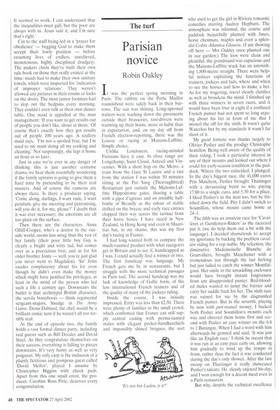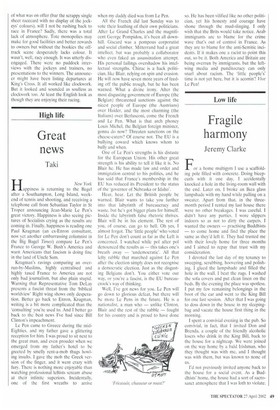The turf
Parisian novice
Robin Oakley
It was the perfect spring morning in Paris. The rabbits on the Porte Maillot roundabout were safely back in their burrows. The sun was shining. Long-aproned waiters were washing down the pavements outside their brasseries, taxi-drivers were warming up their horns, more in habit than in expectation, and, on my day off from French election-reporting, there was the Louvre or racing at Maisons-Laffitte. Simple choice.
Unlike Londoners, racing-minded Parisians have it easy. In close range are Longchamp, Saint Cloud, Auteuil and Vincennes. With a short hop on the Metro, a train from the Gare St Lazare and a taxi from the station I was within 50 minutes sitting at the Pur Sang (Thoroughbred) Restaurant just outside the Maisons-Laffine Hippodrome gates, sharing a table with a gigot d'agneau and an amiable halfbottle of Brouilly as the odour of stable drifted on the breeze and early race entries clopped their way across the tarmac from their horse boxes. I have raced in New Zealand, in Hong Kong and even in Mauritius but, to my shame, this was my first day's racing in France.
I had long wanted both to compare the much-vaunted product with what racegoers get in Britain and to see if, handicapped as I was, I could actually find a winner or two. The first handicap was language. My French gets me by in restaurants, but I struggle with the more technical passages in Paris turf. The second handicap was my lack of knowledge of Gallic form, of the less international French trainers and of the quality of many of the jockeys riding.
Inside the course, I was initially impressed. Entry was less than £2.50. There were plenty of families in the small crowd, which confirmed that France can still supply central casting with perma-tanned males with elegant pocket-handkerchiefs and impossibly shined brogues, the sort
who used to get the girl in Riviera romantic comedies starring Audrey Hepburn. The atmosphere was informal, the course and paddock beautifully planted with limes, horse chestnuts, maples and even a splendid Cedris Adantica Glaucia. (I am showing off here — Mrs Oakley once planted one in our garden.) The loos were clean and plentiful, the grandstand was capacious and the Maisons-Laffitte track has an astonishing 1,800-metre straight. There were helpful notices explaining the functions of trainers, jockeys and lads, where and when to see the horses and how to make a bet. As for my wagering, travel clearly clarifies as well as broadens the mind. I finished up with three winners in seven races, and it would have been four in eight if a confused French punter had not spent so long arguing about his bet in front of me that I missed the off for the sixth. It wasn't quite Waterloo but by my standards it wasn't far short of it.
My good fortune was thanks largely to Olivier Peslier and the prodigy Christophe Semilion. Being well aware of the quality of their riding, I took a particular interest in any of their mounts and looked out where I could for early-season condition in the paddock. Where the two coincided, I plunged. In the day's biggest race, the 41,000 euros Prix Matchem, Peslier brought Thattinger with a devastating burst to win, paying 17.80 to a single euro, and 5.30 for a place. I liked Peslier's in the next too, but he finished down the field. Pity I didn't switch to Soumillon, whose mount came home at 24-1.
The fifth was an amateur race for `Cavalieres et Gentlemen-Riders' as the racecard put it, (we do help them out a bit with the language). I decided shamelessly to accept my ignorance by backing the prettiest cavalfere riding for a top stable. My selection, the diminutive Mademoiselle Blanche de Granvilliers, brought Manchester with a tremendous run through the last furlong but just failed to catch the winner Montfalgoux. Her smile in the unsaddling enclosure would have brought instant forgiveness from any disappointed punter. Red-blooded males wanted to jump the barrier and carry her saddle back for her. The sixth race was ruined for me by the disgruntled French punter. But in the seventh, playing by now with pari-mutuel money, I backed both Peslier and Soumillon's mounts each way and cheered them home first and second with Peslier an easy winner on the 6.8 to 1 Barangay. When I had a word with him afterwards he grinned and said, 'It was just like an English race.' I think he meant that it was run at an easy pace early on, allowing him gradually to wind up the tempo in front, rather than the fact it was conducted during the day's only shower. After the late swoop on Thattinger it really showcased Peslier's talents. He clearly enjoyed his day, and I won enough for a decent meal even in a Paris restaurant.
But why, despite the technical excellence
of what was on offer (bar the scrappy single sheet racecard with no display of the jockeys' colours). will I not be rushing back to race in France? Sadly, there was a total lack of atmosphere. Tote monopolies may make for good facilities and better rewards to owners but without the bookies the offtrack scene desperately lacks colour. It wasn't, well, racy enough. It was utterly disengaged. There were no paddock interviews with the jockeys and trainers, no presentations to the winners, The announcer might have been listing departures at King's Cross. It all worked like clockwork. But it looked and sounded as soulless as clockwork too. At least the English look as though they are enjoying their racing.



































































 Previous page
Previous page